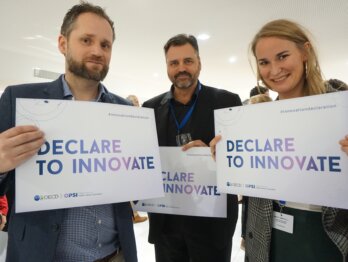The OECD Declaration on Public Sector Innovation: One more step along the innovation journey

Today the Declaration on Public Sector Innovation has been adhered to by national governments from around the world. This is an important milestone in the growing global practice of public sector innovation. It sends a strong signal that this is something that governments believe is a priority. It demonstrates that there is a budding consensus around some of the concepts and principles of public sector innovation.
Access the full OECD Declaration and supporting materials, here.
OPSI thinks this is a big step that will help legitimise the practice of innovation within government, and contribute to a more systemic and structured approach for how governments introduce, implement and assess new approaches.
What signing a declaration will not do, however, is magically make innovation easier or better.
What we know from our work on public sector innovation systems is that it is valuable to contextualise these developments, to see how they fit with a greater whole. There can be a tendency in the public sector to put all hopes on one “magic bullet”, whereas systemic change requires more than that. The OECD Declaration is an important addition to the innovation arsenal, but it will not and cannot do the job alone. We need to understand how things work together, and what their aggregate impact is, if we are to continue to learn and improve.
So how does the OECD Declaration ‘fit’ within the bigger picture of the public sector innovation journey?
Public sector innovation needs to be on the agenda
The work of government matters. Governments are how we, as societies, make collective investments and decisions about what is important. Governments shape the rules and frameworks for our economies and societies. So its important that the public sector is able to support governments as best they can. That, logically, will sometimes require innovation – implementing something novel to the context in order to achieve impact.
Yet public sector innovation is not just a “nice to have” or an occasional thing. Governments today have a seemingly endless supply of issues that they need to handle. Poverty. Eroding trust in government. Inequality. Climate change. Education. Mental health. Transparency. Demographic changes. Regulation. Environmental degradation. Diversity. Economic growth. Biodiversity loss. Digital transformation. The list goes on and on, sometimes varying in emphasis or order of priority for different country contexts, with a common underlying thread to every issue: things need to change. Satisfaction with the status quo is, in many cases, low. There is an expectation that things can, and should, be better. Innovation is needed, sometimes desperately so.
This is further exacerbated by a constantly changing context. In a changing world, we cannot assume that what we have been doing is still the most appropriate or relevant thing, as there may now be new possibilities. New technologies and new conditions mean that government not only needs to look to innovation to see what it might mean for existing problems, but also in order to engage with and prepare for new issues.
Therefore we can see that innovation is necessary in the public sector: whether it be for simply doing better at what is already occurring, for getting needed results across a range of policy challenges, or for getting ready for the world of tomorrow.
Unfortunately, history shows us that just because things need to change, it does not mean that they will – at least, not in the timeframes we might need them to. In the case of the public sector, and as the OECD Declaration notes, there are systemic biases within the public sector for maintaining and replicating the status quo. People expect the operations of government to be stable and dependable. Doing things differently in government is not without risk, and those risks can be much more tangible and stark than the risks of sticking with something that may not be working as well as needed.
So if we cannot expect innovation to occur even though it is needed, then there needs to be deliberate effort, effort that can counteract and mitigate any default settings that are holding against innovation. Otherwise governments will not be able to reliably innovate, instead relying on happenstance or good fortune.
For deliberate action, innovation needs to be firmly placed on the agenda. This is what the OECD Declaration aims to help with. It provides a signal that public sector innovation matters.
The OECD Declaration is only one piece of the puzzle and builds on the efforts of others
The OECD Declaration is just the latest step of many. There have been numerous people who have already helped build the practice of public sector innovation over the past decades. These have included:
- Reformist politicians and senior public servants who have led the way in driving change in the public sector
- Public servants who have been instrumental in introducing innovative projects, demonstrating that innovation is not an abstract but something tangible that can make a difference to people’s lives
- Public sector innovation labs, hubs and initiatives around the world, which each helped provide dedicated attention and space for the development of a public sector innovation practitioner community
- Academics who have helped to provide the theoretical building blocks to make sense of public sector innovation
- Private sector and not-for-profit partners and stakeholders who have helped to support or contribute (or have even led) innovative thinking and ventures in, or for, the public sector.
The OECD Declaration is intended to help further such efforts by providing shared principles for thinking about public sector innovation. Cooperation and collaboration on innovation is easier if we agree on why it is needed, what is involved, and how it can be supported.
The OECD Declaration builds on not only the OECD’s work with countries, but the lessons from others and recognises that various governments and public administrations have tried their hand at this before. For instance, there has been:
- Canada’s Federal, Provincial and Territorial Declaration on Public Sector Innovation
- France’s Manifesto for Public Sector Innovation
- Australia’s Australian Public Service Innovation Action Plan (and the Victorian Public Service Innovation Action Plan that it in turn built upon).
Initiatives such as these have articulated a position on public sector innovation for their respective jurisdictions, helping to give legitimacy to the topic, to emphasise its importance, and to encourage further action. While such acts are important, symbolically and practically, they need to be matched by action and investment. This is unlikely to occur until there is a deliberate approach taken to innovation, something the OECD Declaration is intended to assist.
We have developed the OECD Declaration as a source of inspiration for others, for them to build upon and improve, and to use as a basis for their strategies and actions for getting the best outcomes possible for citizens and service users.
Part of an ongoing journey
Innovation is about things that are new to the context, and is thus about things that have not been done before. Therefore, innovation – as both a process and an outcome – is a continually changing practice. Innovation looks different from what it was in 2000, let alone in 1900. This is why a ‘declaration’, a type of instrument, has been chosen. It sets out principles, rather than specifics, because we do not (and may never) know what exactly should be done. Innovation will continue to evolve, and so too must the way it is supported.
The OECD Declaration is thus an attempt to lead to better questions rather than to provide definitive answers. It tries to help make explicit the issue of public sector innovation, to make it easier for more sophisticated conversations about innovation – e.g. “How can we support innovation in a deliberate fashion to achieve particular goals?” rather than “What is innovation and why do we need it?”.
We at OPSI will be looking to support countries in their adherence to it and we encourage others to endorse it to show their support.
We will also continue to work on developing thinking and actions that can help jurisdictions in taking a more deliberate approach to public sector innovation. Our consultations revealed that there would be value in creating a primer that spelt out the core attributes and nature of public sector innovation, and we intend to do so later in the year. We are also working on a working paper that captures what we’ve learnt from our work with governments and practitioners, combining the insights about the determinants of innovation and the innovation facets.
If you’d like to be involved in this ongoing journey of public sector innovation, then check to see if your country or organisation is signed-up and, if not, work with us to make it happen, sign-up to our newsletter, join our platform or follow us on Twitter. Innovation is never going to be easy, but it’s much easier if it is done collaboratively. We hope the OECD Declaration helps make it just that little bit easier, and can help support the global community of public servants and others interested in how governments can do things in new ways to get better outcomes.












